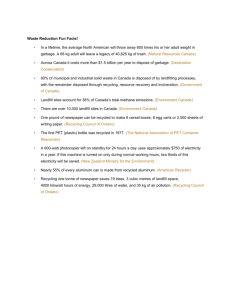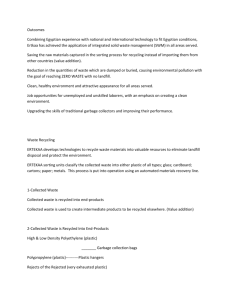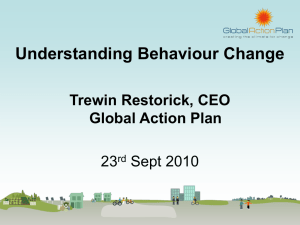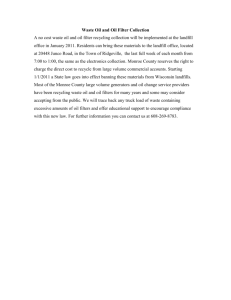Q: Does recycling really have an impact on climate change?
advertisement
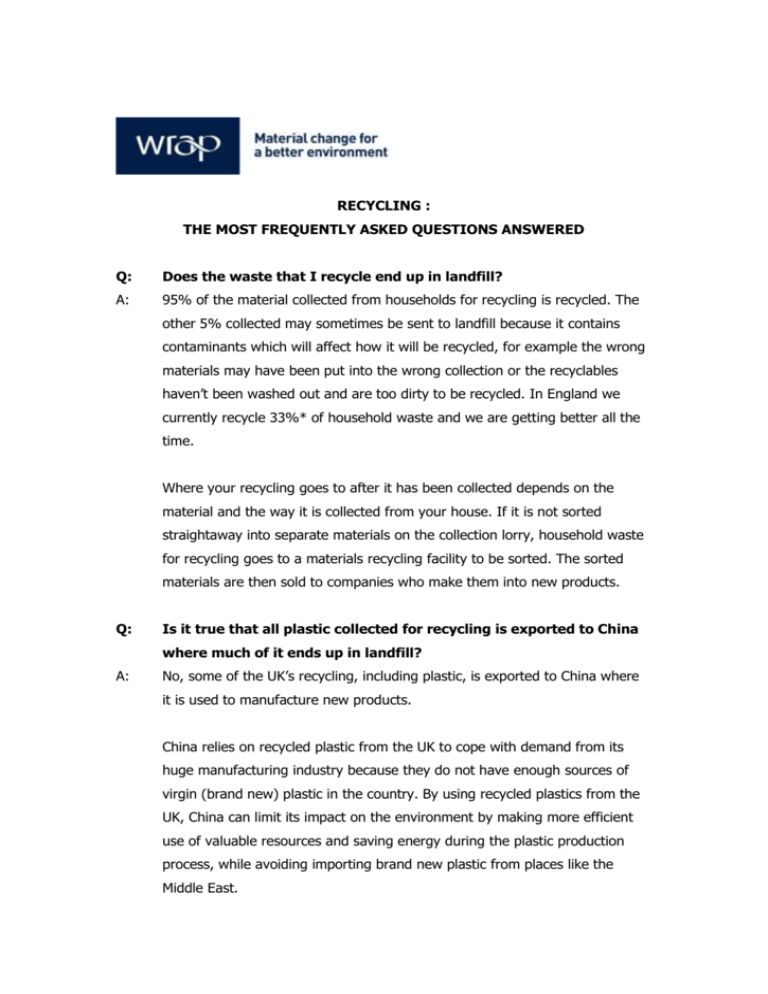
RECYCLING : THE MOST FREQUENTLY ASKED QUESTIONS ANSWERED Q: Does the waste that I recycle end up in landfill? A: 95% of the material collected from households for recycling is recycled. The other 5% collected may sometimes be sent to landfill because it contains contaminants which will affect how it will be recycled, for example the wrong materials may have been put into the wrong collection or the recyclables haven’t been washed out and are too dirty to be recycled. In England we currently recycle 33%* of household waste and we are getting better all the time. Where your recycling goes to after it has been collected depends on the material and the way it is collected from your house. If it is not sorted straightaway into separate materials on the collection lorry, household waste for recycling goes to a materials recycling facility to be sorted. The sorted materials are then sold to companies who make them into new products. Q: Is it true that all plastic collected for recycling is exported to China where much of it ends up in landfill? A: No, some of the UK’s recycling, including plastic, is exported to China where it is used to manufacture new products. China relies on recycled plastic from the UK to cope with demand from its huge manufacturing industry because they do not have enough sources of virgin (brand new) plastic in the country. By using recycled plastics from the UK, China can limit its impact on the environment by making more efficient use of valuable resources and saving energy during the plastic production process, while avoiding importing brand new plastic from places like the Middle East. The recycled materials usually transported to China arrive on empty container ships that are returning from importing goods to the UK. This helps to reduce the effect of transport on the environment. Recycled materials have a value - a tonne of soft drink or milk bottles can be worth around £200 per tonne with the cost of shipping and import duties on top – so it does not make economic sense to export recycled materials to China for them to be dumped in landfill sites. Some plastic exported to China for recycling is spun into polyester fibre for use in manufacturing textiles, such as fleece jackets. It can also be turned into a variety of household items including milk bottles, pipes, crates, bottles and films. Q: Does recycling really have an impact on climate change? A: When we send waste to landfill it biodegrades and produces harmful greenhouse gases such as CO2 and methane, which damage the environment and contribute to climate change. In fact, landfill sites release about 40% of the UK’s methane emissions. By recycling, we reduce the amount of waste sent to landfill and the amount of natural resources used to make brand new materials. Over the last seven years, the amount of municipal waste in England sent to landfill sites has fallen by 23%, from just over 22 million tonnes to 16.9 million tonnes. The amount of waste being recycled and composted in the same period has also more than doubled, from 3.4 million tonnes to nearly 9 million tonnes. By recycling, the UK currently saves 18 million tonnes of CO2 equivalent greenhouse gases per year, which is the same as taking five million cars off the road. Q: Why do I have to wash or rinse out things before recycling them and doesn’t that waste more energy than it saves? A: Rinsing empty containers like food tins keeps the smells and germs to a minimum and makes the containers more manageable when sorted for recycling. Recycled objects are valuable and cleaning them ensures they are not too dirty to recycle. Just rinse them out in the washing-up water once you have finished the dishes. Q: Why is the system my council operates for recycling different from my friend’s just a few miles down the road? A: Many councils run different schemes because they need to design a system that best suits their residents. For example, the collection requirements of a rural area will be very different from that of an inner city. Therefore each local council needs to decide what type of collection and recycling system will be best for their area. Q: Does ‘natural’ waste like food and garden waste biodegrade if it’s sent to landfill? A: Food and garden waste does biodegrade but sending it to landfill is one of the worst ways of disposing of it. This is because as the landfill site fills up and the ‘natural’ waste begins to biodegrade and rot away, the oxygen is used up by bacteria to produce carbon dioxide. Once all the oxygen is gone, different bacteria take over and produce methane, a greenhouse gas 23 times more potent than carbon dioxide. There are several steps we can take to reduce the amount of natural waste we are sending to landfill: Visit www.lovefoodhatewaste.com for hints, tips and recipes to help you enjoy food at its best and minimise food waste. Invest in a compost bin – vegetable peelings, tea bags and coffee grounds can be composted at home in your garden. Many local authorities also collect garden waste, or alternatively many civic amenity sites accept garden waste, so log on to www.recyclenow.com to see what is available in your area. ENDS * Provisional stat based on quarterly updates published by Defra. Current official recycling level for England is 31%.

